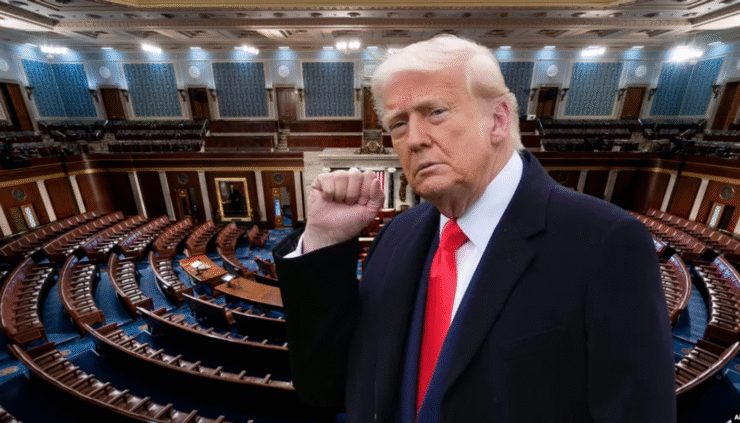The road to comprehensive crypto regulation hit another political snag this week, as the Digital Asset Market Structure Clarity Act — or CLARITY Act — faced turbulence during a House Financial Services Committee hearing. While the session was meant to dissect the bill’s 236 pages of proposals, it quickly veered into controversy as some lawmakers fixated on former President Donald Trump’s personal involvement in the digital asset space.
Democratic lawmakers voiced concern that Trump’s financial ties to crypto—including his NFT projects and reported token holdings—were overshadowing what should have been a neutral policy discussion. “This hearing should have been about building sound policy,” argued Rep. Gregory Meeks (D-N.Y.), adding that Trump’s influence had become a “distraction.”
The bill, introduced by Committee Chair Rep. French Hill (R-Ark.) last week, seeks to establish clearer jurisdictional boundaries between the SEC and CFTC—two agencies often at odds over crypto regulation. It also proposes mandatory consumer disclosures, platform safeguards for user funds, and a framework to define decentralized networks more clearly.
Despite the political friction, the bill has seen early bipartisan traction. While some Democrats voiced ethical concerns, others—including Reps. Ritchie Torres (D-N.Y.), Angie Craig (D-Minn.), and Don Davis (D-N.C.)—indicated openness to the legislation, highlighting a growing desire across party lines to bring stability and legal clarity to the crypto sector.
Crypto, Conflict, and Accusations of Political Overreach
Tensions escalated as Democratic lawmakers raised red flags about what they see as a blurring of lines between Trump’s financial interests and federal policymaking. Some warned that the former president’s direct promotion of crypto assets—including NFTs and potential token holdings—creates ethical conflicts that risk undermining the legitimacy of any regulation tied to his brand, especially in the still-murky world of stablecoin governance.
Republican members, however, pushed back. Rep. Andy Barr (R-Ky.) dismissed the concerns as “baseless political attacks” and an “illogical leap,” arguing that Democrats were derailing serious regulatory progress with partisan distractions. “Let’s focus on sound market structure, not smear tactics,” Barr urged.
His remarks drew a sharp rebuttal from Rep. Jim Himes (D-Conn.), who has previously advocated for bipartisan digital asset legislation. Himes called Barr’s comments a “cheap shot” and warned that tying the bill too closely to Trump risks alienating moderates. “Even members willing to work together won’t support something perceived as rank corruption,” he said.
The clash underscored the increasingly personal nature of crypto policy debate, with Trump emerging as both a symbol of innovation and a lightning rod for criticism.
Lawmakers Debate Decentralization, AML, and Definitions
Amid the political friction, lawmakers still found time to probe the bill’s structural details. Several committee members flagged ambiguity around key definitions, particularly the legal threshold for what constitutes a “decentralized” blockchain network—an issue with major implications for token classification and regulatory oversight.
Others raised concerns about anti-money laundering (AML) provisions. Critics questioned whether the bill’s current language offers sufficient safeguards for crypto platforms operating outside traditional banking rails, especially in light of ongoing enforcement concerns.
Committee members also debated how the bill would separate customer assets from company funds—a provision aimed at avoiding another FTX-style collapse—and whether the legislation’s enforcement structure gives regulators enough power to act in cross-border financial crimes.
In response to the unresolved concerns, Ranking Member Rep. Maxine Waters (D-Calif.) called for a Minority Day Hearing, which would allow Democrats to bring in a separate slate of witnesses and more deeply explore both ethical and regulatory ramifications. Waters also noted that a committee vote could come as early as next week, signaling that the legislative clock is ticking despite the controversy.
Meanwhile, the crypto conversation is heating up in the Senate as well. Sen. Cynthia Lummis (R-Wyo.), one of the most vocal pro-crypto lawmakers on Capitol Hill, told Bloomberg that she expects the Senate to begin work on its own digital asset market structure bill in the coming days.
The timing raises the possibility of a broader congressional showdown—between the House and Senate, and between Democrats and Republicans—over how to define, regulate, and govern the future of crypto in the United States.
Quick Facts
- The CLARITY Act aims to establish clear regulatory roles for the SEC and CFTC.
- Former President Trump’s crypto ventures became a focal point during the hearing.
- Democrats raised conflict-of-interest concerns; Republicans dismissed them as political attacks.
- Lawmakers debated definitions of decentralization and AML safeguards.
- A Minority Day Hearing has been requested; a committee vote may occur next week.
- The Senate is preparing its own crypto market structure legislation.





